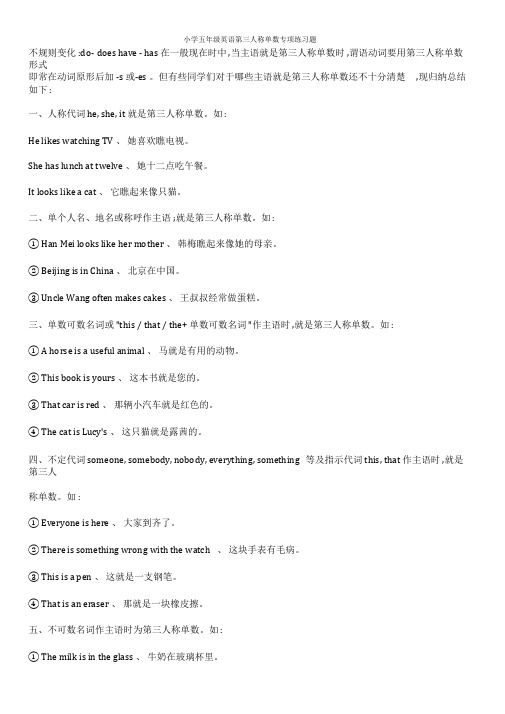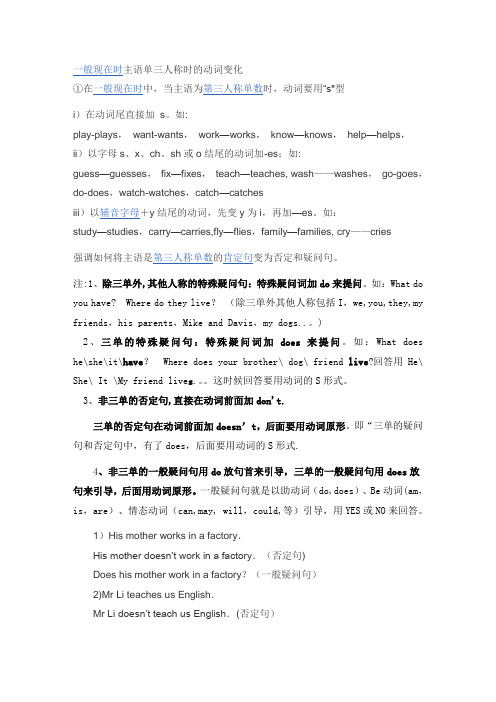五年级英语动词三单和询问职业的句型训练(1.26)
- 格式:doc
- 大小:23.50 KB
- 文档页数:1

小学五年级英语第三人称单数专项练习题不规则变化 :do - does have - has 在一般现在时中 ,当主语就是第三人称单数时 ,谓语动词要用第三人称单数形式即常在动词原形后加 -s 或-es 。
但有些同学们对于哪些主语就是第三人称单数还不十分清楚,现归纳总结如下 :一、人称代词 he, she, it 就是第三人称单数。
如 :He likes watching TV 、她喜欢瞧电视。
She has lunch at twelve 、她十二点吃午餐。
It looks like a cat 、它瞧起来像只猫。
二、单个人名、地名或称呼作主语 ;就是第三人称单数。
如 :①Han Mei looks like her mother 、韩梅瞧起来像她的母亲。
②Beijing is in China 、北京在中国。
③Uncle Wang often makes cakes 、王叔叔经常做蛋糕。
三、单数可数名词或 "this / that / the+ 单数可数名词 "作主语时 ,就是第三人称单数。
如 :①A horse is a useful animal 、马就是有用的动物。
②This book is yours 、这本书就是您的。
③That car is red 、那辆小汽车就是红色的。
④The cat is Lucy's 、这只猫就是露茜的。
四、不定代词 someone, somebody, nobody, everything, something 等及指示代词 this, that 作主语时 ,就是第三人称单数。
如 :①Everyone is here 、大家到齐了。
②There is something wrong with the watch 、这块手表有毛病。
③This is a pen 、这就是一支钢笔。
④That is an eraser 、那就是一块橡皮擦。

五年级疑问词的第三人称单数形式训练引言在研究英语的过程中,掌握疑问词以及它们在不同人称和数形式下的用法是非常重要的。
对于五年级的学生来说,熟练掌握这些知识将有助于他们更好地理解和使用英语。
本文档提供了一些针对疑问词第三人称单数形式的训练题目,帮助五年级学生加深对该部分知识的理解。
训练题目请根据题目要求,选择正确的疑问词的第三人称单数形式填空。
1. — __________ does she go to school?— She goes to school by bus.2. — __________ does he eat for breakfast?— He usually eats cereal and milk.3. — __________ does he live?— He lives in a house near the park.4. — __________ does she like to play?— She likes to play tennis.5. — __________ does he want to be when he grows up? — He wants to be a doctor.6. — __________ does she have for lunch?— She has a sandwich and some fruit.7. — __________ does he go swimming?— He goes swimming on the weekends.8. — __________ does she do her homework?— She does her homework after dinner.9. — __________ does he watch on TV?— He watches cartoons.10. — __________ does she want to visit?— She wants to visit China.总结通过上述训练题目,五年级学生可以加深对疑问词第三人称单数形式的理解和应用。

动词三单练习题五年级上册动词是语言中最基本的词类之一,它用来表示人、物或事物的动作、状态、存在等。
在英语中,动词的单复数形式是有区别的,而动词的三单形式是其中的一个特殊形式。
五年级上册的学习内容中有关于动词三单的练习题,通过这些练习题的学习,可以提高学生对动词用法的理解和掌握。
接下来,我们将提供一些动词三单的练习题,并解答这些练习题。
1. 请根据括号中的动词变为三单形式:a) She (go) to school every day.b) He (play) football with his friends.c) The cat (jump) onto the table.d) The birds (sing) in the trees.e) The monkey (climb) up the tree.解答:a) goesb) playsc) jumpsd) singe) climbs2. 请根据括号中的动词变为三单形式,并使用正确的时态:a) He often (go) swimming in the summer.b) She (do) her homework every evening.c) The dog (bark) loudly at night.d) They (watch) movies on weekends.e) It (snow) in winter.解答:a) goesb) doesc) barksd) watche) snows3. 请根据括号中的动词变为三单形式,并加入适当的时间状语:a) He always (drink) milk before bed.b) She usually (play) the piano in the afternoon.c) The train (leave) at 9 o'clock in the morning.d) They often (visit) their grandparents on weekends.e) The school bus (pick up) the students in front of the school.解答:a) drinksb) playsc) leavesd) visite) picks up4. 请根据括号中的动词变为三单形式,并使用正确的人称代词:a) He (teach) English to us every day.b) She (help) her mother with housework.c) The teacher (explain) the lesson to the students.d) They (meet) their friends at the park.e) It's important for us to (protect) the environment.解答:a) teachesb) helpsc) explainsd) meete) protects通过以上的练习题,我们可以更好地理解和掌握动词三单的用法。

一般此刻时中的第三人称单数形式在一般此刻时中,当主语是第三人称单数时,谓语动词要用第三人称单数形式,即常在动词原形后加 -s 或-es 。
什么是一般此刻时?一般此刻时的基本用法有哪些呢?【一般在的功能】1.表示事物或人物的特点、状。
如:The sky is blue. 天空是色的。
2.表示常性或性的作。
如:I get up at six every day.我每日六点起床。
3.表示客。
如:The earth goes around the sun.地球着太阳。
志(状):once a week, every always, every week (day, year, month ⋯ ,sometimes, at ⋯ , on Sunday ⋯), uausllyoften,never,hardly..........一、人称代词 he, she, it是第三人称单数。
如:He likes watching TV.他喜爱看电视。
She has lunch at twelve.她十二点吃午饭。
It looks like a cat.它看起来像只猫。
二、单个人名、地名或称号作主语;是第三人称单数。
如:①Han Mei looks like her mother.韩梅看起来像她的母亲。
②B eijing is in China. 北京在中国。
③U ncle Wang often makes cakes. 王叔叔常常做蛋糕。
三、单数可数名词或 "this / that / the+单数可数名词"作主语时,是第三人称单数。
如:①A horse is a useful animal.马是实用的动物。
②T his book is yours. 这本书是你的。
③That car is red. 那辆小汽车是红色的。
④The cat is Lucy's. 这只猫是露茜的。
四、不定代词 someone, somebody, nobody, everything, something主语时,是第三人称单数。


①在一般现在时中,当主语为第三人称单数时,动词要用“s"型i)在动词尾直接加s。
如:play-plays,want-wants,work—works,know—knows,help—helps,ii)以字母s、x、ch、sh或o结尾的动词加-es;如:guess—guesses,fix—fixes,teach—teaches, wash——washes,go-goes,do-does,watch-watches,catch—catchesiii)以辅音字母+y结尾的动词,先变y为i,再加—es。
如:study—studies,carry—carries,fly—flies,family—families, cry——cries强调如何将主语是第三人称单数的肯定句变为否定和疑问句。
注:1、除三单外,其他人称的特殊疑问句:特殊疑问词加do来提问。
如:What do you have? Where do they live?(除三单外其他人称包括I,we,you,they,my friends,his parents,Mike and Davis,my dogs..。
)2、三单的特殊疑问句:特殊疑问词加does来提问。
如:What does he\she\it\have? Where does your brother\ dog\ friend live?回答用He\ She\ It \My friend live s.。
这时候回答要用动词的S形式。
3、非三单的否定句,直接在动词前面加don't.三单的否定句在动词前面加doesn’t,后面要用动词原形。
即“三单的疑问句和否定句中,有了does,后面要用动词的S形式.4、非三单的一般疑问句用do放句首来引导,三单的一般疑问句用does放句来引导,后面用动词原形。
一般疑问句就是以助动词(do,does)、Be动词(am,is,are)、情态动词(can,may, will,could,等)引导,用YES或NO来回答。
Unit1-Unit3重点句型:一、询问职业1.What do you want to be? I want to be a teacher.2.What does your mother want to be? She wants to be a cook.3.Do you want to be a pilot? Yes, I do.No, I don’t. I want to be…I want to….二、询问其它1.What subject does Alice want to teach? She wants to teach English.2.Who wants to cook nice food? Joe.3.What do you want to do? I want to sing a song.4.What does Peter want to do? He wants to drive a taxi.三、询问交通工具1.How do you come to school? I come to school by bike. I live far from our school.2.How does your father to school? He comes to school on foot. He lives near my school.四、询问生日1.When’s your birthday? It’s on 26th September.2.When’s Peter’s birthday? It’s on 5th July.3.My birthday is on 15th July.五、询问其他1.Can you come to my birthday party? Sure。
2.Can you bring some orande things to the party?3.What orange things do you have? I have a hat. She has a card.4.Orange is my favourite colour.5.Please come to my birthday party.-语法小结:特殊疑问词:What什么Who谁When 什么时候How 怎样,如何Where哪里How many多少+可数名词复数How much多少+不可数名词,还可以询问价钱短语:1.want to do(动词原形)想去做….2.want to be(+名词)想成为…..3.be good at+现在分词(v+ing)4.be afraid of 害怕…5.fall into落入6.jump into跳入7.put on穿上e to …来到…9.far from来自10 walk to …步行去…=go to…on foot11.take the train/the bus/the car 坐火车/公交车/小汽车12.take….to…乘…到13.get on上车14. get off下车15.welcome to…欢迎来到…16.have some fun玩的开心=have a good time 17.right away立刻,马上。
五年级下册第六课找出主语三单动词三单的句子
1.Let's go and watch the games on the playground!让我们去操场看比赛吧!
2.They are playing football.他们正在踢足球。
3.What are they doing?他们正在做什么?
4.They are playing badminton.他们正在打羽毛球。
5.That's my favorite sports.这是我最喜欢的运动。
6.Can I play it with you?我能和你一起玩吗?
7.What are you doing?你们正在做什么?
We're playing我们正在打网球。
8.Are you watching the high jump?你正在看跳高吗?
9.They’re doing the long jump.他们正在跳远。
10.They’re running so fast.他们跑得那么快。
11.A doing high jump,too?他们也正在跳高吗?
12.Where are you going?你要去哪?
13.I’m going Animals’Olympic Games.我要去动物奥
林匹克运动会。
14.Agoing to win?他们要赢了吗?
15.Who will win the ldamel?谁将赢了狮子,鹿还是骆
驼?。
第五单元What does she do?她是做什么工作的?一.询问某人的职业三种句型:(1)W hat + do(复数)/does(单数)+主语+ do?What(特殊疑问词)+一般现在时态的一般疑问句形式?第二人称单复数(you)+第三人称复数(they)用:do第三人称单数(he+she+人的名字)用:does—What does your father do? 你父亲是干什么的? (父亲是第三人称单数)—He’s a doctor. 他是个医生。—What do you do? 你是干什么的?—I am a taxi driver. 我是个出租汽车司机。(2)What + be+主语?第二人称单复数(you)+第三人称复数(they)用:are第三人称单数(he+she)用:is—What are you? 你是干什么的?—I’m a teacher. 我是个教师。
—What’s your father? 你父亲是干什么的?—A worker (He is a worker). 工人。
(3)W hat’s+形容词性物主代词+ job?—What’s your job? 你的工作是什么?—A teacher. 老师。
二.询问别人将来想从事什么职业。
(1) What is/are +某人单数/复数+going to be?回答:某人单数/复数+is/are going to be+(a/an)+职业名词?What is Xiaoming going to be ?小明将来想从事什么职业?He is going to be a TV reporter.他想成为一名电视台记者。
(2) What do/does+主语+want to be?What does Mary want to be? 玛丽将来想从事什么职业?She wants to be a singer.她想成为一名歌手。
三.特殊疑问句:1.以特殊疑问词开头,对句中某一成分提问的句子叫特殊疑问句。
一般现在时(第三人称单数形式)Hello,boys and girls。
我是一般现在时,你们想知道我的故事吗?Let me tell you!首先,介绍我的本领.我的本领有三样:1.表示事物或人物的特征、状态。
如:The sky is blue。
天空是蓝色的。
2。
表示经常性或习惯性的动作.如:I get up at six every day.我每天六点起床。
3.表示客观现实.如:The earth goes around the sun。
地球绕着太阳转。
第二,请看我的面目——构成:1。
be动词:主语+be(am ,is ,are)+其它。
如:I am a boy。
我是一个男孩。
2。
行为动词:主语+行为动词(+其它).如:We study English.我们学习英语.当主语为第三人称单数(he,she ,it)时,三单变化:1.多数在动词后加s ,play—plays like—likes2.以s,x,sh,ch,o结尾的动词加es go—goes wash-washes 3.4.以辅音字母加y结尾,把y改i再加es,fly—flies 。
元音字母加y结尾的,直接加s,play—plays.5.特殊:have—has第三,我的变化——否定句、一般疑问句、特殊疑问句:1.be动词的变化。
否定句:主语+ be + not +其它。
如:He is not a worker。
他不是工人。
一般疑问句:Be +主语+其它。
如:-Are you a student?—Yes。
I am。
/ No, I'm not。
特殊疑问句:疑问词+一般疑问句.如:Where is my bike?2.行为动词的变化。
否定句:主语+ don’t(doesn’t ) +动词原形(+其它)。
如:I don't like bread。
当主语为第三人称单数时,要用doesn't构成否定句.如:He doesn't often play.一般疑问句:Do(Does ) +主语+动词原形+其它。